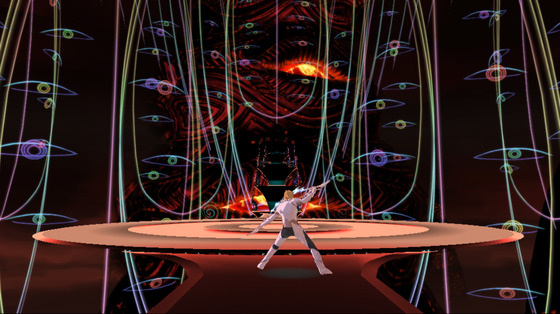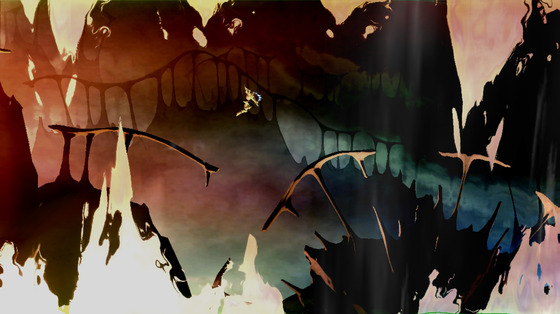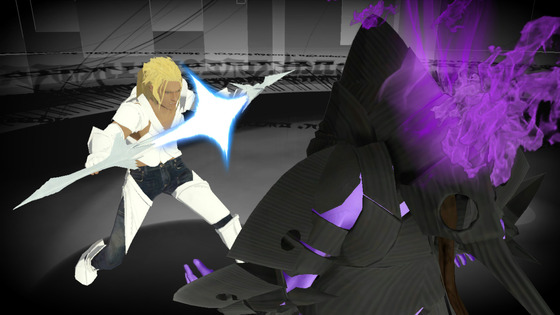
If you ever told me I would play a game based on a bible story and thoroughly enjoy it, I would laugh at you, then proceed to slap you across your face and run away screaming incoherently. El Shaddai: Ascencion of the Metatron has just proven me wrong. The sea isn't boiling, the sky hasn't turned red, nor have any other signs of the apocalypse surfaced. El Shaddai has taken a bible story and flipped it into a truly awe inspiring game.
Overview
El Shaddai is a loose retelling of the Old Testament's Book of Enoch. Several angels have fallen from Heaven and seek to create their own world on Earth, where humans will know only what the fallen angels deem appropriate, and worship them as false Gods. The Lord has dispatched the player, in the role of Enoch, as the last option to purify these fallen angels before the world they have taken falls too far to their corruption, and must be purged.
Gameplay
For a game based on something as needlessly complex as the Bible, El Shaddai plays fairly simply. When you're not standing around dumbfoundedly admiring the beauty of the world around you, you're probably platforming! El Shaddai cuts to-and-fro between 2D and 3D platforming areas, with the former being much easier, for obvious reasons. There is no control over the camera, so you're stuck to platform with the views you're given. As incredible as the world of El Shaddai looks, certain areas become a total pain in the ass to navigate without plummeting to your temporary death. Temporary meaning you'll respawn on a ledge near to where you've fallen. Everything occurring around Enoch is such an acid trip, sometimes the lines between floating platform and bottomless pit become purple hazy.

One button is dedicated to attack, one to jump, one to block, and one to purify weapons. Combos are strung together with single button presses, but that doesn't mean you perform the same string of attacks over and over. During your combo, if you hesitate before your pressing attack, you'll mix it up with a different move, which not only looks cool and does big damage, but also breaks your opponent's guard. You can also hold down the attack button to charge a power attack, both on ground and in air. Finally, pressing guard and attack simultaneously initiates your final type of offensive. These attacks can be mixed together seamlessly for the most part, assuring that you have a method to tackle every enemy you encounter.
There are four different types of weapon: the arch, the gale, the veil, and gangsta certified fisticuffs. The arch looks like the love child of a bow and a chainsaw, complete with circulating serrated edge, used much like a sword. The gale is a hollow disc that works together with a set of projectiles to pierce your enemies from range. The veil are, put simply, hulk hands. You can overpower with slow strikes, or merge the gauntlets together to create a stalwart shield. Bare-handed fighting is much of a last resort, usually only available after a boss has broken your guard, thus shattering your weapon. I do wish there were more weapons to chose from, but the three available to you are very well balanced, each with a rock-paper-scissor dynamic worked in for good measure. You will rarely find these weapons in the world, and more often, will have to rip them from a weary enemies hands, and purify them for your use. After repeatedly beating people's heads in, your weapon will become corrupt, dealing significantly less damage. You can purify your weapon at any time, but it takes a good second or two to execute, so make sure you're not in the midst of an onslaught when doing so or you may die.
On the topic of death, it happens, but rarely. After you've been defeated in combat, you can button mash your way to a revival on the spot, after which Enoch states "No problem, everything is fine." Expect to hear this often. As you die more, it becomes harder to mash back, and eventually it will no longer work, forcing you to resume from the last checkpoint. I died often, but only died a permanent death once or thrice. What really caught me off guard, was the hidden 'bonus' areas that allow you to collect items which unlock a powerful armor for Enoch. These areas are a race against time, as "the darkness" creeps up in an attempt to envelope you. If it does, it's insta-game over, even rolling a credits sequence and epilogue. Unexpected? Yes. Awesome? Yeah, kinda.

Art Direction
If I were to describe the art of El Shaddai in one word, it would be eyegasm. That's an orgasm for the eyes in case you were wondering, and I know you were. Enemies are well imagined and executed, as are encounters. Wait 'til you get a load of the battle with Armaros, an amazing what-the-fuck moment. Actually, the overall design of El Shaddai is one massive what-the-fuck. As you ascend the tower of the fallen angels, the environments become more and more oddly beautiful. From line art, to tie dye, water colored pastels, and the sterile nothingness of industrial steel. You can expect to see everything that is nothing like you've seen before, including a playground for animated uvulas.
More often than I'm used to, I stopped in my tracks so I could take in all that was happening around Enoch. Everything is so full of life and vivid, you would never guess the world around you is slowly dying of corruption. I cannot stress how beautiful every last aspect of El Shaddai is. I can count on one hand how many games have compelled me to look at each shred of concept art in the gallery. This is one of them. And I can't even begin to explain how the FFVII Midgar inspired Azazel's Zeal level fits in to scheme of things. You just have to play through it yourself.
Sound Direction
I can give the audio of El Shaddai no stronger endorsement than this: I played the entire game without once toggling the voice settings. For the first time in recent memory, I listened to the entirety of a Japanese designed game in English. Every character is well scripted and well acted, specifically Jason Isaac's Lucifel. Omnipotent and omnipresent, Lucifel isn't shy about breaking the fourth wall, which he does on multiple occasions through his narration and gig as a circuit between Enoch and the big man upstairs. The same can be said for the voice acting of all the archangels and fallen angels, especially that Armaros. Whoooaaann, amirite?
The music is a mix of heavenly synths and typical, poppy game music you'd expect from Japanese development. It works just fine, with as many catchy tracks as there are forgettable. Every once in a while, my attention was captivated by a section of mind-bending art and completely drew me in for a minute or so. During some of these instances, you'll realize just how properly fitting the music is. Then, as if Lucifel snapped his fingers, you'll awaken and be on your way through the tower without even realizing you just zoned the fuck out.

Conclusion
I've said it way too many times already, but let me drive it home. El Shaddai is visually stunning. You will not play many games that look like this in your lifetime, and that alone makes it worth your time. Like any good game, El Shaddai has its flaws, and whether or not it's worth $60 is a big question mark. However fans of psychedelic artistic innovation will be overjoyed with this Old Testament tale.
Buy it: If you think the Bible is boring, if you love religion twisting tales, if you are fascinated by creativity
Don't buy it: If you need multiplayer to enjoy a game
The Score: 9 outta 10 Blasters!
